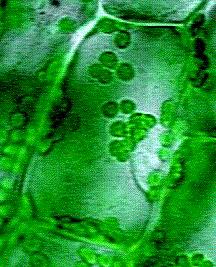


 |
|
|
|
|
| A vacuole is a fluid-filled space with a membrane found in the cytoplasm of a cell. | |
| Vacuoles are often found in animal cells but only appear when they are needed, then disappear. | |
| Single-celled organisms (such as amoeba) form food vacuoles around their prey and use vacuoles to control their water content. White blood cells form similar vacuoles around pathogens to engulf them. | |
| In plant cells, vacuoles are permanent. They are made of a membrane called the tonoplast and are filled with cell sap. | |
| The current theory of stomatal opening suggests that the guard cells of a leaf are made turgid when their water content increases through the movement of water by osmosis into the cell vacuole. |
|
|